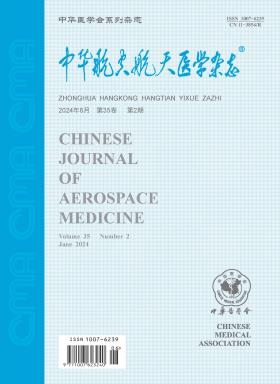战斗机飞行员高原训练前后血清生化变化
引用次数: 0
摘要
目的探讨高原缺氧环境对战斗机飞行员肝肾心代谢功能参数的影响,为高原航空医疗服务提供依据。方法采用全自动生化分析仪对35名战斗机飞行员高原训练前后的血清生化指标进行检测和比较,并用配对t检验对结果进行分析。结果与高原训练前相比,高原训练后飞行员空腹血清天冬氨酸转氨酶(AST)、白蛋白(ALB)、尿素氮(BUN)水平略有或显著降低(t=2.042、10.329、2.275,P<0.05或<0.01),但仍在正常范围内。直接胆红素(DBIL)、肌酐(Cr)、β2-微球蛋白(β2-MG)、乳酸脱氢酶(LDH)、肌酐激酶(CK)、总胆固醇(TC)均显著高于训练前(t=3.792 ~ 12.454, P<0.01),但基本处于正常范围或接近上限;尿酸(UA)显著高于训练前和正常水平(t=4.373, P<0.01);丙氨酸转氨酶(ALT)、总胆红素(TBIL)、总蛋白(TP)、胱抑素C (Cys C)、葡萄糖(Glu)、甘油三酯(TG)水平无显著变化。结论高海拔环境对飞行员部分肝脏、肾脏、心脏和代谢功能均有影响。因此,应加强预防措施。关键词:海拔;肝功能检查;肾功能检查;尿酸;飞行员本文章由计算机程序翻译,如有差异,请以英文原文为准。
Serum biochemical changes in fighter pilots before and after plateau training
Objective
To evaluate the influence of plateau hypoxia environment on the parameters of liver, renal, cardiac and metabolic functions of fighter pilots, and provide the basis for the high altitude aeromedical service.
Methods
Serum biochemical indices were examined and compared among 35 fighter pilots before and after 3-month high altitude training by automatic biochemistry analyzer and the results were analyzed by paired t-test.
Results
Compared with those before plateau training, pilots' fasting serum aspartate aminotransferase (AST), albumin (ALB), blood urea nitrogen (BUN) levels after plateau training were decreased slightly or significantly (t=2.042, 10.329, 2.275, P<0.05 or <0.01), but were still in the normal range. Direct bilirubin (DBIL), creatinine (Cr), Beta2-microglobuline (β2-MG), lactate dehydrogenase (LDH), creatinine kinase (CK), total cholesterol (TC) were significantly higher than those before the training (t=3.792-12.454, P<0.01), but were basically in the normal range or approaching to upper limits; uric acid (UA) was significantly higher than that before training and the normal (t=4.373, P<0.01); alanine aminotransferase (ALT), total bilirubin (TBIL), total protein (TP), cystatin C (Cys C), glucose (Glu), triglycerides (TG) levels did not change significantly.
Conclusions
This study elucidated that high altitude environment can affect pilot's partial liver, renal, cardiac and metabolic functions. So the preventive measures should be strengthened.
Key words:
altitude; liver function tests; kidney function tests; uric acid; pilots
求助全文
通过发布文献求助,成功后即可免费获取论文全文。
去求助
来源期刊

中华航空航天医学杂志
航空航天医学
自引率
0.00%
发文量
2962
期刊介绍:
The aim of Chinese Journal of Aerospace Medicine is to combine theory and practice, improve and popularize, actively advocate a hundred flowers bloom and a hundred schools of thought contend, advocate seeking truth from facts, promote the development of the related disciplines of aerospace medicine and human efficiency, and promote the exchange and penetration of aerospace medicine and human efficiency with other biomedical and engineering specialties.
Topics of interest for Chinese Journal of Aerospace Medicine include:
-The content of the journal belongs to the discipline of special medicine and military medicine, with the characteristics of multidisciplinary synthesis and cross-penetration, and mainly reflected in the aerospace industry, aerospace flight safety and efficiency, as well as the synthesis of special medicine, preventive medicine, environmental medicine, psychology, etc.
-Military aeromedicine (Air Force, Navy and Army aeromedicine) and civil aeromedicine, with a balance of aerospace medicine are the strengths of the journal.
-The change in aerospace medicine from a focus on promoting physiological compensatory adaptations to enhancing human performance under extreme environmental conditions is what the journal is helping to promote.
-The expansion of manuscripts in high altitude medicine is also a special emphasis of the journal.
 求助内容:
求助内容: 应助结果提醒方式:
应助结果提醒方式:


